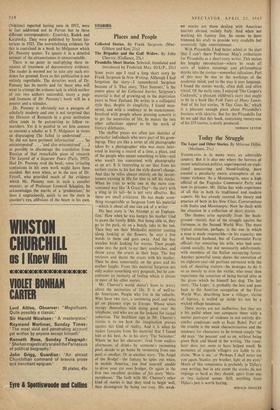Today the Struggle
The Leper and Other Stories. By Milovan Djilas. (Methuen, 21s.)
YucostAvis is in many ways an admirable country. But it is also one where the horrors of recent totalitarian politics, superimposed on tradi- tional massacring and blood-feuding, have created a peculiarly exotic atmosphere of ex- treme violence. As a Montenegrin, once a high official of the Yugoslav Communist Party and now its prisoner, Mr. Djilas has wide experience of all this in both its traditional and modern aspects. He has already covered the theory and practice of both in his New Class, Conversations with Stalin and Montenegro. Now he deals with the situation in a collection of short stories.
The themes arise naturally from the back- ground—mainly that of the struggle against the Germans in the Second World War. The most typical situation, perhaps, is the one in which a man is made responsible—in his capacity, not of betrayed husband, but of Communist Party official—for executing his wife, who had asso- ciated socially, but not necessarily adulterously, with members of the Italian occupying forces. Another powerful scene shows the execution of an eighteen-year-old partisan entrusted with the task of shooting traitors—he manages to do it so as merely to stun the victim, who must then experience the sensation of being buried alive in the grave which he himself has dug. The last story, 'The Leper,' is probably the best and goes back to the Austrian occupation of the First World War, describing how a villager, victim of leprosy, is walled up inside his but by' a wicked village headman.
These stories are not ineffective, but they are a bit pallid when' one compares them with a master portrayer of violence in not entirely dis- similar conditions such as Isaac Babel. Part of the trouble is the weak characterisation and the tendency for characters to be termed simply 'the old man,' the peasant' and so on, without being given flesh and blood in the writing. The trans- lator does not seem to have helped much. In moments of anguish villagers are liable to ex- claim, 'Woe is me.' or 'Perhaps I shall never see you again, Stanko, my brother, light of my eyes.'
Much of this remoteness is probably in Djilas's own writing, but in any event the stories do not impinge as hard as they should, apart from one or two isolated scenes. Still, anything from Djilas's pen is worth having.
RONALD HINGLEY






























 Previous page
Previous page